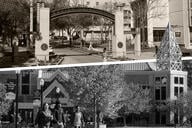You have /5 articles left.
Sign up for a free account or log in.
All Saints' Chapel at the University of the South is a five-story Gothic church with vaulted ceilings and a stained-glass window that mimics the cathedrals of Europe. Located at the center of campus at the college, known as Sewanee, it is a prominent reminder of the university's link to the Episcopal Church.
Since July, the chapel has also been at the center of a conundrum at the college: Given the disagreements within the Episcopal Church over blessing same-sex relationships, should the university allow such blessings at All Saints'?
Sewanee’s situation is fairly unusual but not unique. A handful of mainline Protestant denominations allow the blessing of same-sex relationships, or at least do not forbid it, leaving the ultimate decision up to local authorities like bishops or to individual congregations.
For religious colleges, that can mean making another decision about who can and who can’t wed in their chapels -- and, in states that do not permit same-sex marriage, whether those couples can hold another ceremony to honor their bond. Many colleges already restrict chapel weddings to students, graduates and employees. But as denominations shift their positions on homosexuality, colleges may find themselves navigating more controversial issues within the church.
In July, the Episcopal Church approved a new liturgy to bless same-sex relationships, which went into use Dec. 2. The rite, which has much in common with a marriage ceremony, is intended to be used even in states where gay marriage is illegal. Bishops that do not approve of the new liturgy can forbid its use within their jurisdiction.
The new rite posed a particularly thorny question for Sewanee. The university, which includes an Episcopal seminary, is owned by 28 dioceses in the United States, and the bishops of those dioceses make up the university’s board of trustees. The bishops do not share a common stance on the issue, but several members of Sewanee's Board of Trustees urged their fellow bishops in July to vote against the new liturgy. One, a bishop in South Carolina, has tried to secede from the Episcopal Church as a result.
The controversy placed Sewanee in a tricky position, said John McCardell Jr., Sewanee’s vice chancellor and president. The college itself isn’t part of any diocese, and its religious governing authority is the chancellor, a post that rotates among the bishops of the 28 owning dioceses.
“An absolute yes or an absolute no was just not possible,” McCardell said. The college feared its chapel could become a sort of Las Vegas for blessings of gay unions -- an end-run for couples whose bishops wouldn’t permit the rite in their own diocese.
The compromise: Gay and lesbian couples who meet the other eligibility requirements for a Sewanee wedding will be able to have their union blessed in the college chapel, as long as their bishops are supportive.
McCardell described the decision, reached by the college chaplain, dean of the School of Theology, and the two bishops on the Board of Regents, which oversees university governance, as “the only sensible thing.”
Weddings at Sewanee are relatively rare, and McCardell said he doesn’t expect a flood of requests to bless gay unions. (Tennessee, where Sewanee is located, doesn’t permit gay marriage.) At least one member of the couple must be a student, graduate, member of the faculty or staff or a governing board, or a full-time resident of Sewanee. They must also be part of a church, with a letter from their minister, and both members of the couple must write letters about why they wish to marry at the university.
Augustana College, in Rock Island, Ill., also isn’t in a state that allows gay marriage. But the college, affiliated with the Evangelical Lutheran Church in America, made a decision last month to open its chapel to blessings of gay unions. The Lutheran church has no official policy on such blessings, and allows congregations to decide whether they will support gay marriages or unions.
Augustana already forbids discrimination based on sexual orientation, and the college’s president, Steve Bahls, who made the decision to bless same-sex unions, saw it as a logical extension of that policy.
While Illinois doesn’t allow gay marriage, Rock Island is right across the Mississippi River from Iowa, which does -- so it’s possible the chapel could include a church wedding for couples who also hold a civil ceremony in Iowa, Bahls said. What to call the ceremonies will be up to the couples and their pastors, Bahls said.
About 25 weddings take place in the college chapel each year. At least one member of each couple must be an Augustana graduate, student or employee, or the child of an employee. Bahls said he expects the college will host only a few same-sex unions annually, but began considering the policy change after a same-sex couple requested to use the chapel this fall.
“Times are changing, and there simply is not enough commitment in our world,” Bahls said. “If couples ask their pastor to bless that commitment and it’s consistent with church hierarchy, it’s a wonderful thing to do and a beautiful thing to do.”
Bahls was nervous about what reactions the decision might draw. In an e-mail to students, faculty and staff, he acknowledged that opinions on gay marriage differ within the church. Since his announcement in November, responses have been overwhelmingly supportive, he said. He has received more e-mail than about any other decision he made as president, and all but a few of the messages have been in favor.
“Times have changed here,” he said. “The lesson I've learned is this is a decision that is being supported by our community. The reaction of students is, ‘Why didn’t you do this earlier?’”
And unlike at Sewanee, alumni and children of faculty and staff have already expressed interest. Two ceremonies at Augustana are already scheduled, and will be celebrated in the spring.




